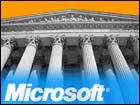
WASHINGTON (CNN/Money) -
The government hammered away at Microsoft Corp. chairman Bill Gates in court Tuesday, attempting to portray him as an unreliable witness. And at one point Gates offered to alter his sworn testimony, landing a solid blow against Microsoft's position.
The courts have found that Microsoft violated antitrust laws. The current hearings, under U.S. District Judge Colleen Kollar-Kotelly, will decide what restrictions will be imposed on Microsoft as a remedy for that illegal behavior. Gates has repeatedly complained that the remedies under consideration would be technically impossible to comply with or would force Microsoft to withdraw its Windows operating system from the market and force widespread layoffs at the company.
The Department of Justice and half of the states involved in the original antitrust case reached a settlement with Microsoft in November. But nine states -- California, Connecticut, Florida, Iowa, Kansas, Massachusetts, Minnesota, Utah and West Virginia, along with the District of Columbia -- broke with the Justice Department's remedy proposal, arguing that it wasn't strong enough. Judge Kollar-Kotelly will decide what sort of remedies are appropriate based on the hearings now in their sixth week.
Steven Kuney, who represents the dissenting states, continued his cross-examination of Gates, who first took the stand late Monday morning. Gates spent much of Tuesday morning complaining that the language of the states's proposal was vague and ambiguous. But Kuney repeatedly walked Gates through his arguments, and several times got Gates to concede that he was interpreting the language in the proposed remedies literally, rather than reasonably, as a court would likely do.
In fact, at one point in his testimony Gates told the court that a section of the proposed remedies "could be read to ban Microsoft from competing in any product category. I know such a ban would be unreasonable, and yet that is what the language of Section 8 appears to provide for."
Click here to check other software stocks
Gates argued that the restrictions in the proposal would do things like prevent his company from quickly offering a patch for a critical security hole before two months had passed. Kuney scoffed at such claims, suggesting that no reasonable person would interpret the restrictions as forbidding emergency repairs for Windows users.
Kuney turned to testimony from the original antitrust trial, which ran from 1998 to 2000, to impeach Gates as witness. For instance, Gates testified that Navigator was "supposedly" a threat to Microsoft's monopoly power in the market for desktop computer operating systems, suggesting that he did not believe that, although the courts concluded that was Microsoft's primary motivation for committing many of its illegal acts. Kuney introduced e-mail from Gates written in the Nineties suggesting that he himself viewed Netscape as such a threat.
After nearly an hour, Gates suddenly said, "I'd be glad to strike the word "supposedly.""
A triumphant Kuney replied, "Well, I'm always interested in hearing ways you want to change your sworn testimony," to a few gasps in the courtroom.
Kuney was using a tactic successfully employed by government lawyers during the trial, calling the veracity of Microsoft's witnesses into question without trying to refute every claim made by them. The tactic proved quite successful in the past, but there's no telling whether this judge will also believe that if some things in the testimony cannot be relied upon, none of the testimony should be given much weight.
By day's end, Kuney returned to the opening theme of his cross-examination, asking Gates if his company had stopped all the practices that the courts had found illegal. Gates said that it had.
But then Kuney pointed out that the Appeals Court had found that co-mingling code so that one item, such as the Internet Explorer Web browsing software, could not be removed from the operating system without breaking Windows, was specifically cited by the appeals court as problematic. Gates said Microsoft had allowed computer makers to hide access to Internet Explorer, but that actually removing the co-mingled code is technically impossible.
If the courts insisted, he said, Windows would have to be withdrawn from the market. "I don't see how we could comply," Gates said.
The cross examination continues Wednesday.
--from CNNfn producer Dave Wilson

|

